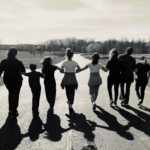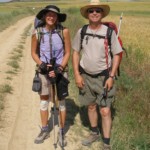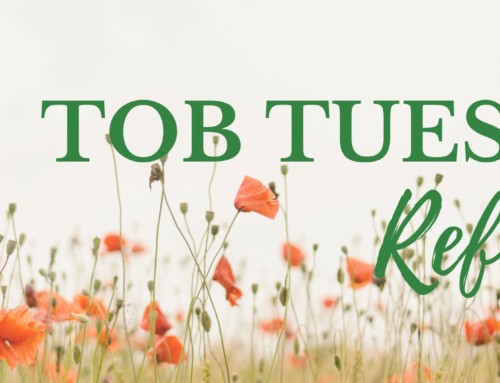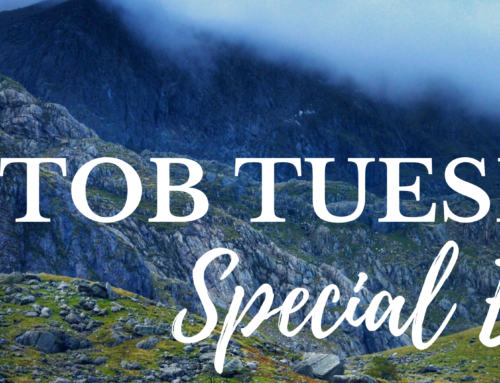The Camino and Coming Out of COVID by Katrina J. Zeno, MTS
 Reset. This word seems to be popping up everywhere to describe emerging from the COVID-19 quarantine. My father’s former personal-trainer described on her Facebook page how she intends to resist returning to the overwhelming daily demands of pre-COVID and instead embrace the “reset” in her life that occurred during the weeks of forced quarantine. For her, the forced slowdown brought new opportunities for being more relational, more self-reflective, and more in-touch with her spiritual life even while continuing her strength training. This sounds a lot like what happens to someone who hikes the Camino de Santiago de Compostela pilgrimage trail in Northern Spain.
Reset. This word seems to be popping up everywhere to describe emerging from the COVID-19 quarantine. My father’s former personal-trainer described on her Facebook page how she intends to resist returning to the overwhelming daily demands of pre-COVID and instead embrace the “reset” in her life that occurred during the weeks of forced quarantine. For her, the forced slowdown brought new opportunities for being more relational, more self-reflective, and more in-touch with her spiritual life even while continuing her strength training. This sounds a lot like what happens to someone who hikes the Camino de Santiago de Compostela pilgrimage trail in Northern Spain.
When hiking the Camino, it’s almost impossible to resist the “reset” that happens along the way. For starters, you can only travel each day as far as your feet can take you. This forced slowdown opens an entrance into one’s interior world, often previously unexplored. Pilgrims commonly speak about a kind of mini-review of their life that occurs almost spontaneously: The first week is spent reviewing one’s past, replaying and re-evaluating hurts, wounds, and unplanned script-changes with a kinder and more compassionate acceptance of one’s self and other’s choices. Acceptance, perspective, and forgiveness often emerge as the fruit of this first stage.
The second week is characterized by pondering one’s current life – one’s relationships, work, satisfactions, dissatisfactions, life goals, spiritual sensibilities or lack thereof, dreams, and desires. Desiring deeper meaning and purpose along with re-evaluating one’s pre-Camino pace of life and goals are often the fruit of stage two.
The third or last stage of thought, prompted by an awareness that the Camino is ending soon, focuses on one’s future life accompanied by Camino-prompted resolutions. Almost always these resolutions center on being more relational, living more simply and more spiritually, and stopping to “smell the flowers” along the way of life. In other words, pilgrims ponder how to reconfigure their lives in order to sustain the “reset” that hiking day after day, relating to other pilgrims, and the slower pace of life has engendered.
One of the most significant take-aways for many pilgrims is the “aha” moment of how much one really needs to live a happy life. Or should I say, how little one really needs.
One of the most significant take-aways for many pilgrims is the “aha” moment of how much one really needs to live a happy life. Or should I say, how little one really needs. When you have to carry your basic survival items on your back, suddenly 10 changes of outfits, a hair dryer, multiple electronic devices, and $400 worth of make-up or sports paraphernalia become superfluous. You squarely face all the “stuff” you normally think is essential but come to realize is not – and is even a distraction to what is truly meaningful.
 It strikes me that the COVID-19 experience issues a similar invitation: we’ve been on an essentials-only pilgrimage for 2+ months. Particularly for those in severe lockdown situations, and even for many who experienced a less severe but still restrictive quarantine, we’ve had our own “aha” moment when we’ve realized just how much we can live without (think “no haircut” for 12 weeks). In the end, “stuff” doesn’t make you happy (although it does feel good to shed the shaggy mane!). What really matters are the people you share life with and the deepening of relational bonds that sustain us in good times and in bad, in freedom of movement and in quarantine.
It strikes me that the COVID-19 experience issues a similar invitation: we’ve been on an essentials-only pilgrimage for 2+ months. Particularly for those in severe lockdown situations, and even for many who experienced a less severe but still restrictive quarantine, we’ve had our own “aha” moment when we’ve realized just how much we can live without (think “no haircut” for 12 weeks). In the end, “stuff” doesn’t make you happy (although it does feel good to shed the shaggy mane!). What really matters are the people you share life with and the deepening of relational bonds that sustain us in good times and in bad, in freedom of movement and in quarantine.
Recapturing this relational sense of being is truly what Christianity is all about. Our roots lie in God’s original covenant relationship with Adam and Eve, Noah, Abraham, Moses, and the people of Israel. This is neatly summarized in the Scriptural phrase, “I will be their God and they will be my people.” Israel understood themselves as the People of God, as the people who belonged to Yahweh.
They, too, knew what it was to be a pilgrim people – Abraham was called out of modern-day Iraq to journey to a land God would show him. The Hebrews were called out of Egypt to be on pilgrimage back to the promised land. The Israelite nation taken into captivity – into long years of “lockdown” – was called by the prophets to rediscover Yahweh’s presence in their midst even without the Temple (for us: the Eucharist). Their captivity led to a period of intense self-reflection and rekindled hope in the promise of restoration, a future kind of “reset” for the purified and humbled nation.
My own experience of hiking the Camino and of COVID-19 echoes these pilgrimage experiences of forced simplification, self-reflection, and the invitation to grow in relationality.
My own experience of hiking the Camino and of COVID-19 echoes these pilgrimage experiences of forced simplification, self-reflection, and the invitation to grow in relationality. Even though I am an introvert, the Camino lured me into relationality as I encountered people from all over the world on a day-to-day basis. In fact, it’s not uncommon for a “Camino family” to form where you find yourself eating, chatting, and lodging with the same collection of pilgrims for multiple weeks. Unexpectedly, I found myself hiking with a heavy-metal-musician, engineer, extrovert from Germany, something only Divine Intervention could have arranged – and it was immensely healing.
Likewise, when one is quarantined at home with family, eventually you can’t help but be relational. You find yourself eating, chatting, and lodging with the same collection of family members for weeks on end. While the re-introduction into each other’s orbit on a constant basis can be bumpy or even “blister-producing,” it can also be incredibly healing. It takes time to confront hurt-filled patterns of relating and to replace them with new bonding experiences that reconfigure the relationship and bring familial healing.
Inspired by various social media posts during quarantine, I asked a few of my friends to describe their rediscovery of family relationality during this time. A father of eight (seven girls and one boy, the boy being the youngest) offered this window into his quarantine experience: “While I’ve experienced many things being stripped away from me, they’ve been replaced by spending more quality time with my wife and children, unlike any other time in our 28 years of marriage. Our two college-age daughters came home for their spring break…and proceeded to stay with us for two months! Because of the lockdown, they were ‘stuck’ here with us. We spent more time together on a daily basis than at any point since before high school – playing games, talking regularly, singing, praying, and discussing the future together. We got to relate to them as adults in a more concentrated way than ever. It has been a true gift and blessing.”

 Another friend, with multiple children, whose work outside the home had kept her running constantly from one demand to another, eventually settled into a new rhythm and pace. She observed, “Once the shock of the complete halt of time and the erasing of all the ‘things to do’ on the calendar sunk in, I surprisingly found joy in rediscovering the gifts that lay deep in each of us. We had time to pass on to our children a love for baking, gardening, and carpentry. We created a beautiful living space out of an old, unused shed. We now have a bountiful garden. And we have all enjoyed, probably too much, recipes we were always too busy to attempt. The fact that this lockdown coincided with springtime helped us experience growth and new life.”
Another friend, with multiple children, whose work outside the home had kept her running constantly from one demand to another, eventually settled into a new rhythm and pace. She observed, “Once the shock of the complete halt of time and the erasing of all the ‘things to do’ on the calendar sunk in, I surprisingly found joy in rediscovering the gifts that lay deep in each of us. We had time to pass on to our children a love for baking, gardening, and carpentry. We created a beautiful living space out of an old, unused shed. We now have a bountiful garden. And we have all enjoyed, probably too much, recipes we were always too busy to attempt. The fact that this lockdown coincided with springtime helped us experience growth and new life.”
And finally, a friend confined to her small apartment in Madrid for two months saw her quarantine “camino” yield a more interior fruit. She candidly shared this with me: “The time we spent holed up at home with the threat of a killer virus lurking seemingly everywhere gave me plenty of time to look inward and take a good look at myself. Ideally, we Catholics would not be unsettled by the thought of death, but, having never really faced the question myself before in concrete terms, I struggled. I felt glued to the relatively good life we have constructed for ourselves, unwilling to consider the idea of going anywhere else, even into the loving arms of Christ. Wrestling with this became the chief spiritual task of my confinement. Holy Week, Easter, and meditating on the Resurrection and the Glorious Mysteries of the rosary became key as I slowly loosened my heart’s grip on my earthly life. I feel like I finally can embrace fully Psalm 84:11, ‘Better one day in your courts than a thousand elsewhere.’ I’ve always known it in principle, but now I’m closer to adopting it at my core.”
Isn’t this precisely what coming out of COVID and hiking the Camino can do for us – to adopt in our core those changes forced upon us that relandscaped our interior hierarchy of values (less driven, more trust; less stuff, more simplicity) and reworked our most immediate relationships, often with surprising results? The challenge, of course, will be to sustain the “reset” in us and our relationships – or to hike the Camino so as to consolidate those gains and continue our inner transformation.
© Katrina J. Zeno, MTS
(Please “share” this blog – and invite your friends to like the JPII Resource Center FB page. Thank you.)




